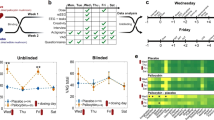Abstract
Objective: To evaluate the in vivo effects of moderate consumption of red wine, beer and spirits on antioxidants, antioxidant enzymes and antioxidant capacity.
Design: Randomized, diet-controlled, cross-over study.
Subjects: Twelve apparently healthy, non-smoking middle-aged men were included; 11 of them completed the study.
Interventions: Each subject consumed four glasses of red wine, beer, spirits and water (negative control) with evening dinner during four successive periods of 3 weeks, daily at the Institute. The total diet was supplied to the subjects and had essential the same composition during these 12 weeks.
Results: Neither the enzyme activities of serum glutathion peroxidase, erythrocyte glutathion reductase and superoxide dismutase nor the plasma concentrations of α- and γ-tocopherol, lutein, zeaxantin, β-cryptoxanthin, lycopene and α-carotene were affected. Plasma β-carotene concentrations were decreased after 3 weeks′ consumption of red wine, beer and spirits (40 g alcohol/day) as compared to consumption of water, by 15% (P=0.0005), 11% (P=0.010) and 13% (P=0.003), respectively. Also, plasma ascorbic acid was decreased after beer (15%, P=0.004) and spirits (12%, P=0.030), but not after wine consumption. Serum uric acid concentrations were increased after consumption of beer (15%, P<0.0001), spirits (8%, P=0.008) and red wine (9%, P=0.003). The overall serum antioxidant capacity, assessed as Trolox equivalent antioxidant capacity (TEAC), was similar for all treatments.
Conclusions: Moderate consumption of red wine, beer and spirits has counteracting effects on plasma antioxidant components, resulting in no significant effect on overall antioxidant status. The effects on antioxidant parameters are largely independent of the type of alcoholic beverage, and probably irrelevant to chronic disease risk.
Sponsorship: Dutch Foundation for Alcohol Research (SAR).
European Journal of clinical Nutrition (2000) 54, 586–591
This is a preview of subscription content, access via your institution
Access options
Subscribe to this journal
Receive 12 print issues and online access
$259.00 per year
only $21.58 per issue
Buy this article
- Purchase on Springer Link
- Instant access to full article PDF
Prices may be subject to local taxes which are calculated during checkout
Similar content being viewed by others
Author information
Authors and Affiliations
Contributions
Guarantors: M van der Gaag and H Hendriks.
Contributors: MvdG and HH were responsible for the design, the conduct of the study and the laboratory and statistical analyses. RvdB and HvdB were responsible for the development of the assay for total antioxidant capacity and measurement of these capacities. MvdG wrote the manuscript, and all contributors have approved the manuscript.
Corresponding author
Rights and permissions
About this article
Cite this article
van der Gaag, M., van den Berg, R., van den Berg, H. et al. Moderate consumption of beer, red wine and spirits has counteracting effects on plasma antioxidants in middle-aged men. Eur J Clin Nutr 54, 586–591 (2000). https://doi.org/10.1038/sj.ejcn.1601061
Received:
Revised:
Accepted:
Published:
Issue Date:
DOI: https://doi.org/10.1038/sj.ejcn.1601061
Keywords
This article is cited by
-
Application of phycobiliproteins from Leptolyngbya sp. KC45 for natural illuminated colourant beverages
Journal of Applied Phycology (2021)
-
Positive association between plasma antioxidant capacity and n−3 PUFA in red blood cells from women
Lipids (2006)
-
Single and repeated moderate consumption of native or dealcoholized red wine show different effects on antioxidant parameters in blood and DNA strand breaks in peripheral leukocytes in healthy volunteers: a randomized controlled trial [ISRCTN68505294]
Nutrition Journal (2005)



